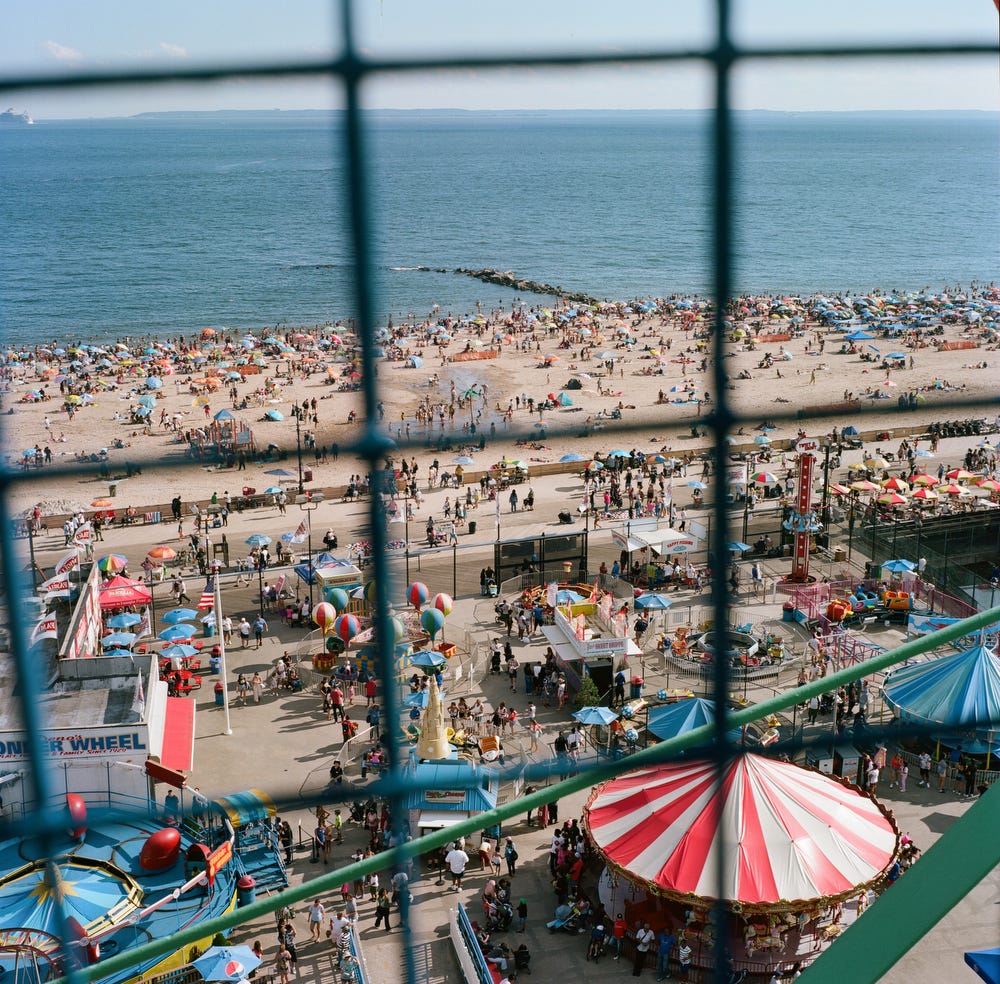A True Life Built is a living photo essay on starting over and building a truer life. It’s for anyone, at any age, who is finding the courage to begin again. Subscribe for free posts.
As the roller coaster clicked skyward over Coney Island, I had just enough time before the drop to regret my recent choices. I was strapped in horizontal, Superman-style, about to plunge through a series of sickening loops because a teenager told me this would be “fun.”
“If I vomit on this, I’m holding you responsible,” I told her, strapped in to my left.
“Too late to back out now!” she crowed.
I had breezily agreed to go on “any ride” because I was auditioning to be a Cool Aunt. I had only known my niece for four hours and my coolness was off to a dubious start. She was not technically my niece, but my cousin’s daughter, visiting Brooklyn for the first time. My cousin and I were close growing up, but then life happened: three daughters for her, two international moves and a divorce for me. Somehow, 20 years had passed and my niece was now 14.
Most of my friends’ kids are under five, but recently I’ve spent more time with more tweens and teens, both my niece and others. They exist in a fascinating borderland between child and young adult, equal parts savvy and shy. One minute they’re telling raunchy jokes and the next they’re going down a slide. In my Cool Aunt bootcamp, I’ve learned that skinny jeans mark you as a “geriatric millennial,” Lizzo is no longer “a flex,” and “slay” is no longer a verb. It turns out that using the word wrong, and watching them roll their eyes, is half the fun.
Hanging out with them, I felt both old and energized—and a little nervous. With little kids, I’m simply an adult in their orbit, my presence unquestioned. But tweens and teens are more selective about who they admit. Who am I, a single woman at 41, to a fourteen-year-old?
My niece and I started the day with vintage shopping. I figured I could nail this: I loved vintage at her age, and still do. She pulled piles of clothes for the dressing room while my cousin and I flipped idly through racks, catching up. The outfits my niece chose were a mix of funky and flirty, half 50s housewife and half 90s Madonna. At one point, she came out in a skin-tight lace-up sheath and asked what we thought.
“It’s a bit tight,” my cousin said diplomatically.
“Can you even sit down in it?” I asked, less diplomatically.
In answer, my niece dropped to the dressing room floor, both proving that she could and that she probably shouldn’t. When she disappeared back into the dressing room, I asked my cousin if she would be allowed to wear that dress to school. My cousin said there was no school dress code, and that my niece would argue that it’s unfair to police women’s clothing when we don’t do the same to men. Yet, as a mother, she worried about the signal some outfits sent.
Time looped back on itself. I was suddenly a teenager again, feeling invincible and determined to own my own style. Yet at the same time I saw my niece’s outfit through older, more maternal eyes. I felt a surge of protectiveness, knowing well the ways society judges what women put on their bodies. I wished I could give her a fairer, more feminist world—and I was relieved when she put the dress back on the rack. I was surprised to find how much I cared.
In my slice of American culture, we lack language for caring about children who are not ours; aunt is the closest we come. In many societies globally, aunties without children of their own are seen as essential. In ours they are an afterthought. Bonds tend to be defined by roles in nuclear families, drawing a bright line between those who are mothers and those who are not. You are either wholly responsible for a child’s wellbeing or you are on your own.
Our mindset hasn’t caught up to the demographics: today, 1 in 4 college-educated women will never have children, up from 1 in 10 in the 1970s. I am part of the first generation of women living without children in significant numbers. Yet in a society that centers nuclear families, this still feels like a deviation from the norm. We have many role models for building careers, but few for building relationships with kids who are not our own. We are defining the role as we go.
Our language for women without children is still defined by the absence of them. We are either sadly “childless” or avidly “childfree.” But I am not less without a child, nor do I seek to be free of them. I don’t have to bring a child into the world to love the ones that are already here.
There is no language for what women like me have to offer—our attention, our energy, our interest—or what we have to gain. As an aunt, I get to re-experience the best parts of young adulthood, like the delight of finding the perfect outfit at the vintage store. I also get a different satisfaction from an afternoon riding roller coasters—not because I enjoy it, but because my niece does. It’s akin to motherhood, yet separate from it. I can care without caretaking. At the end of the day, I walk the new path for women and go home on my own.
As for my audition for Cool Aunt, I think I slayed. When it came time to leave Brooklyn, my niece didn’t want to go. “I like Brooklyn,” she said. “And why am I just meeting Liz now??”
That was my bad, hon. I just didn’t have the language yet for my role in loving other people’s children. Now I know: You don’t need blood to build a bond. All you need to do is show up.
Other writers I’ve found useful on this topic:
Women without Kids, by Ruby Warrington.
has a great interview with the author here. There were many parts that hit home for me, but particularly this:“Walking any path that diverges from the norm leads to a kind of internal self-inquiry. I do not think it’s a coincidence that many women without kids historically have been writers, therapists, and engaged in other ways with the creative and healing arts. Women who, beginning with their own process of self-reflection, have gone on to dedicating their lives to understanding and making peace with the more confusing, psycho-social aspects of the human condition.”
Selfish, Shallow, and Self-Absorbed: Sixteen Writers on the Decision Not to Have Kids, by
. This captures a whole lovely range of feelings about the idea of one’s own children. As one essay by Pam Houston puts it:It also seems honorable that another woman would value motherhood over all my priorities. But I do not believe that I am selfish and she is not. Selfishness and generosity are not relegated to particular life choices, and if generosity is a goal—and I believe it is—perhaps our task is to choose the path for us that creates its best opportunity.
One of the unexpected joys of starting over has been hearing from others on similar journeys. If something resonates with you, I’d love for you to leave a comment, drop me an email or share a post with a friend!
Liz is a writer and photographer based in Brooklyn






I'm not surprised you totally hit it off with "niece." You are the cool aunt! Can we still say "totally"?
It makes sense why we don’t have this label. Having children is “expected” of women. At 48 I am not nor have not raised any children, but like you I am not really child free. My world is full of other people’s children whom I get to live and enjoy and send home.
Thanks for talking about this.